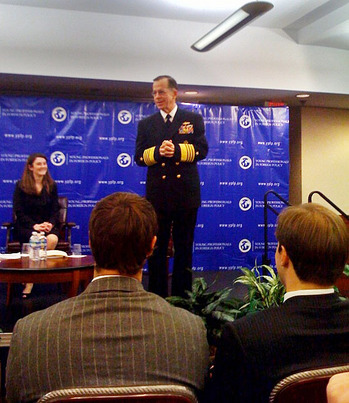
Katherine Tiedemann is a program associate at the New America Foundation.
Last night I attended an event sponsored by Young Professionals in Foreign Policy featuring Admiral Michael Mullen, the Chairman of the Joint Chiefs of Staff (apologies for the poor picture quality–the iPhone camera is still woefully lacking).
The conference room was packed, and you could hear a pin drop when Admiral Mullen entered the room. He touched on many different topics, but I want to highlight what he said were his three main priorities. They are, in order, as follows:
1. “Broader turmoil” in the Middle East. Admiral Mullen correctly stated that the whirlpool of problems in the Middle East, from wars in Afghanistan and Iraq and volatility in Pakistan to a weak relationship with Iran and Hamas and Hizbullah gaining power and legitimacy presents the “most unstable and daunting challenge that we have as a country.”
His main concern with Afghanistan is the “lack of governance” at every level, and he agreed with his colleague Michael Maples, head of the Defense Intelligence Agency, of the crucial need to grow the Afghan National Army (widely trusted by the Afghan people) and the Afghan National Police (plagued by corruption and inefficiency) beyond their current sizes of around 80,000 Afghans each.
I agree with Admiral Mullen that “it’s not about Afghanistan – it’s about Pakistan and Afghanistan” together. The regional dimensions of Pakistan’s relationships with both India and Afghanistan are integral to understanding the Pakistani culture and people and crucial to tackling the myriad of problems facing Pakistan today.
2. “Health of the force.” Admiral Mullen’s second priority when he took on the chairmanship of the Joint Chiefs was bolstering the “brilliant, resilient, but stressed” American armed forces, who are currently not getting enough time at home while facing a growing threat abroad. The next 24 months are “fragile,” according to Admiral Mullen, with respect to meeting all the mission requirements tasked to the US military.
3. The rest of the world. I think it’s sad, but understandable, that the entire “rest of the world” is both third down on Admiral Mullen’s priority list and broadly lumped together. The Admiral’s recent trips to Brazil, Peru, Chile, Colombia, and Mexico are commendable, but a few country visits aren’t enough to show Latin and Central America that we are serious about engaging in partnerships and dealing with shared challenges like the financial crisis, which Admiral Mullen pointed to as his “overarching concern.”
As a side note, the Admiral told us that he doesn’t think President Calderon is “getting enough credit” for taking on the dangerous drug cartels in Mexico (more than 1,000 have been killed in drug-related violence in January of this year alone, and Mexican drug-trafficking organizations have a presence in some 230 US cities.)
On the topic of Iran, Admiral Mullen asserted, “I believe Iran is on the path to nuclear weapons,” but he is in “wait and see mode” regarding what the nature of the relationship will be with President Obama. Critically, he frowned that “Iran is in the middle of a lot more that is negative than positive.”
At the same time, Mullen noted that “Even at the darkest of times with the Soviet Union, we were talking,” evidently disapproving of the US’s 30-year lack of diplomatic relations with Iran.
Obviously you can’t have everything be your number one priority, and generally speaking, I agree with the Admiral’s ordering. It’s unfortunate that the broader Middle East remains the dominant foreign policy issue on the Chairman of the Joint Chiefs of Staff’s agenda, but hopefully as President Obama receives the results of his strategic reviews in Pakistan and Afghanistan and the drawdown of troops from Iraq continues, we will see some changes implemented for the better that will allow the United States to focus on other areas of the world that deserve our attention.
— Katherine Tiedemann


4 comments on “Guest Post by Katherine Tiedemann: Admiral Mullen’s Priorities”